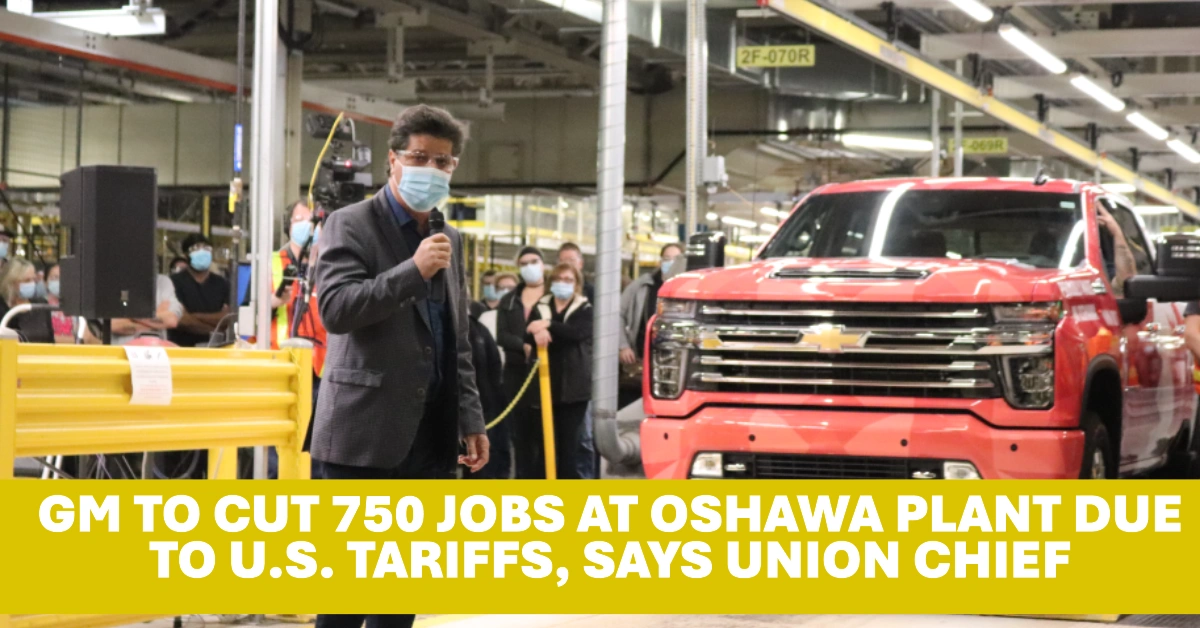General Motors has announced it will cut approximately 750 jobs at its Oshawa Assembly Plant, a move triggered by ongoing tensions around U.S. trade tariffs. The plant, which currently employs about 3,000 people, will be reducing its operations from three shifts to two starting this fall.
According to Unifor, the union representing auto workers at the plant, the decision comes as a direct response to a 25 per cent tariff imposed by the U.S. on vehicle imports—an action spearheaded by President Donald Trump.
Lana Payne, national president of Unifor, condemned GM’s decision, calling it “reckless” and “a direct blow to our members.” She emphasized that this shift reduction won’t only affect the plant’s direct workforce, but could also ripple through Ontario’s broader auto parts supply chain, potentially impacting another 1,500 workers.
Table of Contents
GM’s Position: A Strategic Shift, Not a Layoff?
Automaker Says Demand and Trade Conditions Are Changing
In a statement issued by GM spokesperson Jennifer Wright, the automaker said the shift reduction was based on “forecasted demand and the evolving trade environment.” She added that the change is part of GM’s strategy to focus the Oshawa plant more heavily on Canadian truck production.
GM insists it is “committed to supporting employees through the transition,” although it has stopped short of labeling the move as formal layoffs. Unifor, however, sees it differently.
“They’ve issued the six-month layoff notices. That means this is happening,” Payne told CBC Toronto. “But we will fight every single day to reverse it.”
Political Fallout: Ottawa and Queen’s Park Respond
Prime Minister Carney and Premier Ford Weigh In
Newly elected Prime Minister Mark Carney addressed the layoffs during his first major news conference, expressing “deep sympathy” for the affected workers and promising to fight for the sector.
“We are working to ensure companies maintain their commitment to Canadian jobs and investment,” Carney said. “And if they don’t, there will be consequences.”
Ontario Premier Doug Ford echoed the sentiment in a statement posted on social media, calling the situation “extremely tough” for affected families. He reaffirmed GM’s ongoing commitment to the Oshawa facility and pledged ongoing provincial support.
Unifor Slams Timing of GM’s Move
Union Calls It “Premature and Disrespectful”
Unifor has criticized GM for moving ahead with shift reductions even before scheduled economic talks between Prime Minister Carney and President Trump. Payne described the decision as both “premature” and “disrespectful,” arguing that GM jumped the gun without waiting for the outcome of high-level trade discussions.
The union is now urging the federal government to revisit GM’s exemption from Canadian retaliatory tariffs under the remission framework. It also wants a meeting with automakers to reaffirm their long-term commitments to Canadian production.
Other Automakers Under Pressure
Stellantis Also Closing Its Windsor Plant Temporarily
The impact isn’t limited to GM. Stellantis announced it would temporarily shut down its Windsor assembly plant next week. While no direct link to tariffs has been made, the closure adds to growing concerns about the stability of Canada’s auto manufacturing base.
Ontario NDP Leader Marit Stiles blasted the Ford government’s lack of action, demanding a clear and immediate plan to protect auto jobs across the province.
CUSMA Exemption Offers Limited Relief
Auto Parts May Be Protected, But Assembly Jobs Still at Risk
While a new clarification under the Canada-U.S.-Mexico Agreement (CUSMA) provides tariff exemptions for compliant auto parts, the protection does not extend to all aspects of vehicle production. Canadian union leaders argue this only shields American factories that rely on Canadian parts—and does little to preserve Canadian assembly jobs.
“This exemption changes nothing for our assembly plants,” Payne said. “It’s designed to keep U.S. factories running, not ours.”
2026 Toyota RAV4 in Canada: Release Date and Pricing Expectations
Can Canadian Consumers Help Save the Industry?
Look for a VIN Starting with “2”
As Canada’s auto industry faces uncertain times, experts are encouraging consumers to support Canadian-made vehicles. Flavio Volpe, president of the Automotive Parts Manufacturers’ Association, explained on CBC Radio that consumers can identify Canadian-built cars by checking the VIN number.
“If the VIN starts with a 2, that means it was built in Canada,” Volpe said. “That’s one of the best ways Canadians can support local jobs.”
A Troubled History: Oshawa’s Plant Reopened Just Three Years Ago
This isn’t the first time Oshawa’s auto workers have faced mass layoffs. GM shuttered the plant in 2019, laying off nearly 98 per cent of its workforce. Vehicle production only resumed in late 2021. Now, just a few years later, those same workers face another wave of uncertainty—one driven not by market demand alone, but by global trade policy and political maneuvering.
In Summary:
General Motors’ decision to reduce shifts at its Oshawa Assembly Plant underscores the vulnerability of Canada’s manufacturing sector in a volatile trade environment. With hundreds of jobs on the line and the future of Ontario’s auto industry in question, union leaders, political officials, and industry advocates are rallying to protect what remains of Canada’s once-thriving auto manufacturing legacy.

